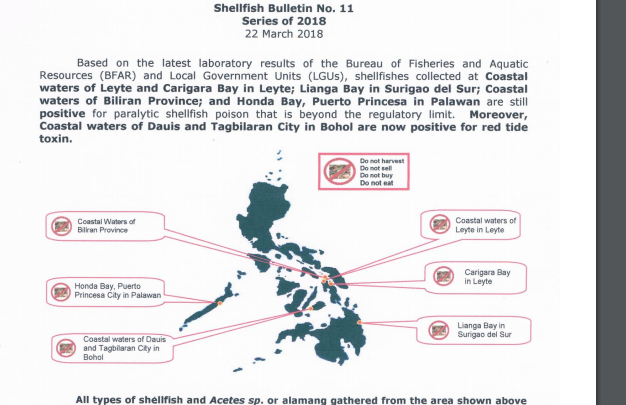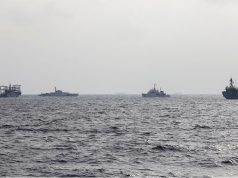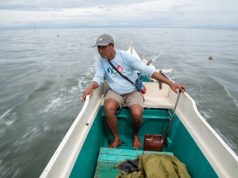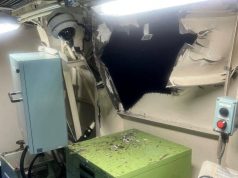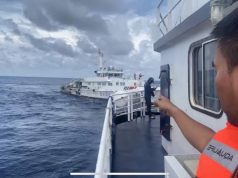MANILA – Government scientists have raised the alert to the continuing risk of paralytic shellfish poisoning to humans from the red tide plague that still persists in coastal waters off several southern provinces.
“Based on the latest laboratory results of the Bureau of Fisheries and Aquatic Resources (BFAR) and Local Government Units (LGUs), shellfishes collected at coastal waters of Leyte and Carigara Bay in Leyte; Lianga Bay in Surigao del Sur; Coastal waters of Biliran Province; and Honda Bay, Puerto Princesa in Palawan are still positive for paralytic shellfish poison that is beyond the regulatory limit,” the BFAR’s latest bulletin, issued Thursday (March 22) evening, said.
“Moreover, coastal waters of Dauis and Tagbilaran City in Bohol are now positive for red tide toxin,” added BFAR. For regular updates and complete red tide bulletins, it advised the public to visit this page:http://www.bfar.da.gov.ph/redtide
According to a Department of Health advisory, Paralytic Shellfish Poisoning (PSP) “is a life-threatening syndrome associated with eating contaminated shellfish.”
It is caused by Red Tide microorganisms in shellfish (tahong, talaba, halaan or mussles, oysters and clams))
The DOH said the symptoms are purely neurological and onset “is rapid that it can be felt within 12 hours.”
Most of the symptoms are neurological, said DOH:
• Sense of numbness around the mouth or the face
• Dizziness
• Pricking sensation and/or paralysis of hands and feet
• Body weakness
• Rapid pulse beat
• Difficulty in talking, swallowing, breathing
• Headache
Certain gastrointestinal symptoms such as abdominal pain, vomiting and diarrhea may also be felt by some of those afflicted.
In severe cases of PSP, DOH said, “supportive treatment, especially ventilatory support/artificial respiration, is given.”
Fluid therapy is also resorted to by some health care experts, and/or detoxification with coconut water and brown sugar, according to DOH.
To prevent the serious health risk, DOH strongly warns against eating shellfish from areas where there is a red tide warning.
People should also avoid eating alamang and small fishes; wash thoroughly and remove gills and intestines of fish, squids and crabs; and remove heads of shrimps, said DOH.

